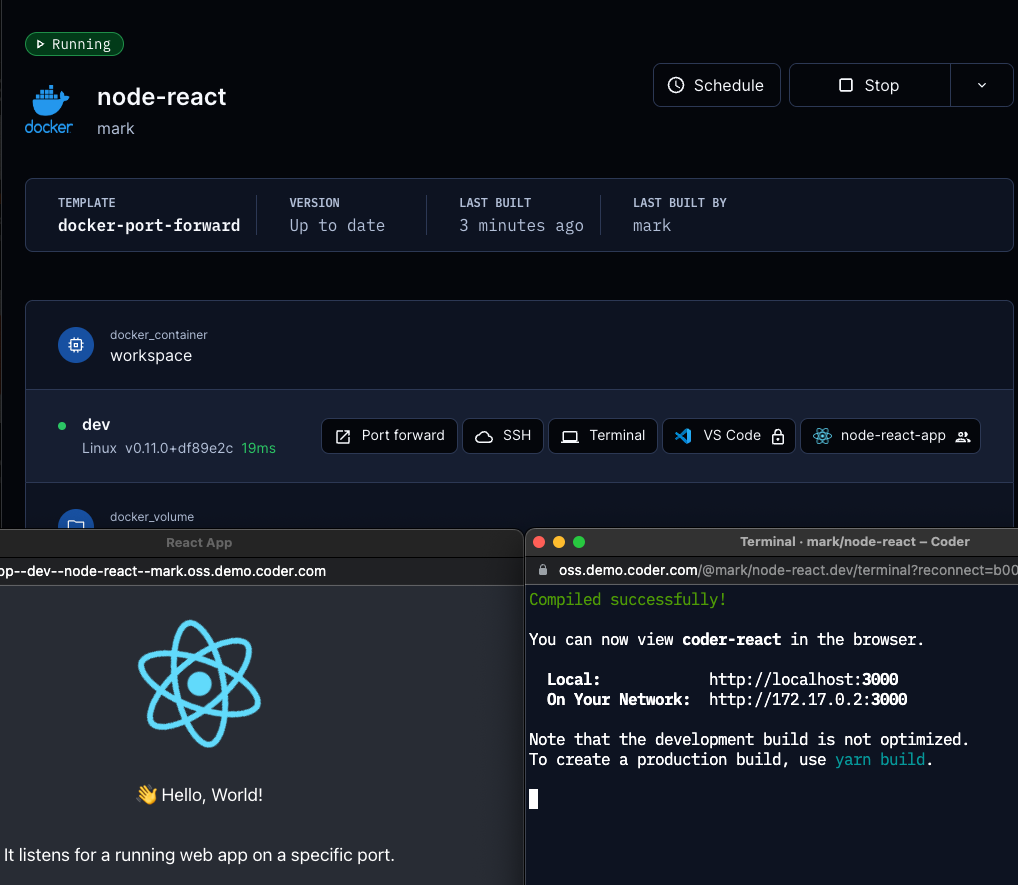Port Forwarding
Port forwarding lets developers securely access processes on their Coder workspace from a local machine. A common use case is testing web applications in a browser.
There are three ways to forward ports in Coder:
- The
coder port-forwardcommand - Dashboard
- SSH
The coder port-forward command is generally more performant.
The coder port-forward command
This command can be used to forward TCP or UDP ports from the remote
workspace so they can be accessed locally. Both the TCP and UDP command
line flags (--tcp and --udp) can be given once or multiple times.
The supported syntax variations for the --tcp and --udp flag are:
- Single port with optional remote port:
local_port[:remote_port] - Comma separation
local_port1,local_port2 - Port ranges
start_port-end_port - Any combination of the above
Examples
Forward the remote TCP port 8080 to local port 8000:
coder port-forward myworkspace --tcp 8000:8080
Forward the remote TCP port 3000 and all ports from 9990 to 9999
to their respective local ports.
coder port-forward myworkspace --tcp 3000,9990-9999
For more examples, see coder port-forward --help.
Dashboard
To enable port forwarding via the dashboard, Coder must be configured with a wildcard access URL. If an access URL is not specified, Coder will create a publicly accessible URL to reverse proxy the deployment, and port forwarding will work. There is a known limitation where if the port forwarding URL length is greater than 63 characters, port forwarding will not work.
From an arbitrary port
One way to port forward in the dashboard is to use the "Port forward" button to specify an arbitrary port. Coder will also detect if processes are running, and will list them below the port picklist to click an open the running processes in the browser.

From an coder_app resource
Another way to port forward is to configure a coder_app resource in the workspace's template. This approach shows a visual application icon in the dashboard. See the following coder_app example for a Node React app and note the subdomain and share settings:
# node app
resource "coder_app" "node-react-app" {
agent_id = coder_agent.dev.id
slug = "node-react-app"
icon = "https://upload.wikimedia.org/wikipedia/commons/a/a7/React-icon.svg"
url = "http://localhost:3000"
subdomain = true
share = "authenticated"
healthcheck {
url = "http://localhost:3000/healthz"
interval = 10
threshold = 30
}
}
Valid share values include owner - private to the user, authenticated - accessible by any user authenticated to the Coder deployment, and public - accessible by users outside of the Coder deployment.

SSH
First, configure SSH on your
local machine. Then, use ssh to forward like so:
ssh -L 8080:localhost:8000 coder.myworkspace
You can read more on SSH port forwarding here.


